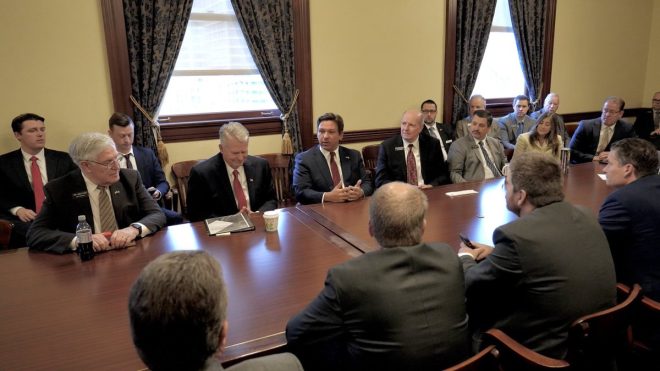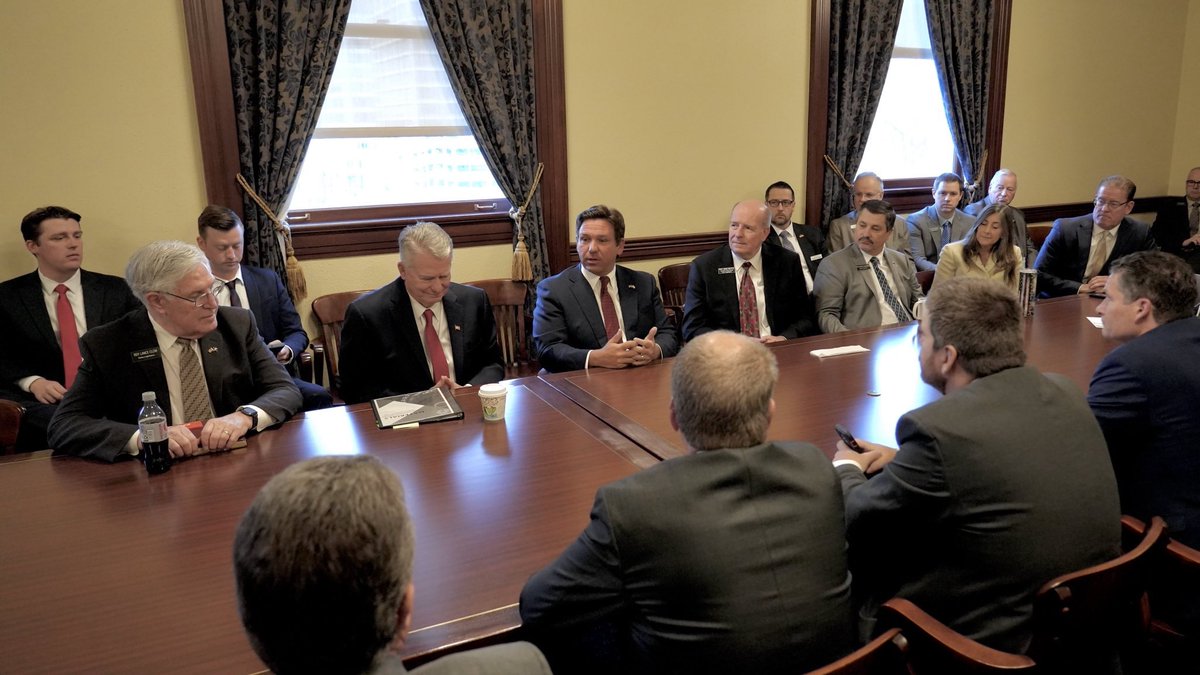
Balanced Budget Amendment: A Call for Constitutional Change
In a significant political move, Florida Governor Ron DeSantis recently joined Idaho Governor Brad Little to advocate for a resolution aimed at amending the U.S. Constitution to mandate a Balanced Budget Amendment (BBA). This initiative has gained traction as 26 states, including Florida, have already passed similar resolutions, emphasizing a growing desire for fiscal responsibility at the federal level.
What Is a Balanced Budget Amendment?
A Balanced Budget Amendment would require the federal government to not spend more than it earns in a given fiscal year. This means that the government would need to balance its budget, similar to how many states and households operate. The primary goal of such an amendment is to eliminate the federal deficit and control the national debt, ensuring that future generations are not burdened with excessive financial obligations.
The Growing Support for a BBA
The push for a Balanced Budget Amendment is rooted in concerns about the rising national debt, which has surpassed $31 trillion. Advocates argue that a constitutional requirement for a balanced budget would enforce fiscal discipline, reduce government spending, and help stabilize the economy. The support from multiple states highlights a bipartisan recognition of the need for more stringent fiscal measures.
Governor DeSantis’s involvement in this movement underscores his commitment to conservative fiscal policies. By rallying support from other states, he aims to create momentum for a national conversation about government spending and fiscal accountability.
- YOU MAY ALSO LIKE TO WATCH THIS TRENDING STORY ON YOUTUBE. Waverly Hills Hospital's Horror Story: The Most Haunted Room 502
The Political Landscape
The advocacy for a Balanced Budget Amendment is gaining attention amid ongoing debates over government spending and economic policy. Proponents argue that the amendment would prevent future administrations from engaging in irresponsible fiscal practices, ensuring that the government remains accountable to taxpayers. Critics, however, caution that such an amendment could limit the government’s ability to respond effectively to economic crises, such as recessions or natural disasters.
State-Level Resolutions
The movement for a Balanced Budget Amendment has seen significant state-level support. As of now, 27 states, including Florida, have passed resolutions calling for a constitutional convention to discuss and potentially ratify a BBA. This growing coalition reflects a widespread desire among state leaders to take proactive measures to address federal spending and debt issues.
The Path Forward
To successfully implement a Balanced Budget Amendment, proponents will need to navigate a complex political landscape. The process involves gathering support from two-thirds of the states to call for a constitutional convention, followed by a three-fourths majority for ratification. This daunting task requires a concerted effort from lawmakers, advocacy groups, and the public to raise awareness and build momentum for the initiative.
Economic Implications
The potential introduction of a Balanced Budget Amendment could have far-reaching economic implications. Supporters believe that by enforcing fiscal discipline, the amendment would lead to greater economic stability, lower interest rates, and increased investment. Conversely, opponents argue that such rigid fiscal constraints could hinder the government’s ability to address urgent economic needs, particularly during times of recession.
Conclusion
The call for a Balanced Budget Amendment is a significant development in the ongoing conversation about fiscal responsibility in the United States. With bipartisan support from governors like Ron DeSantis and Brad Little, the movement seeks to address concerns about national debt and government spending. As more states join the push for a BBA, the possibility of a constitutional amendment becomes increasingly tangible, presenting both opportunities and challenges for the nation’s economic future.
SEO-Optimized Keywords
- Balanced Budget Amendment
- U.S. Constitution
- Fiscal Responsibility
- National Debt
- Government Spending
- State Resolutions
- Economic Stability
- Political Advocacy
- Ron DeSantis
- Brad Little
By incorporating these keywords naturally throughout the content, this summary is optimized for search engines, facilitating greater visibility and engagement from audiences interested in fiscal policy, government accountability, and the ongoing discussions surrounding the Balanced Budget Amendment.

I joined Governor Brad Little in Idaho today to urge lawmakers to consider a resolution to amend the U.S. Constitution to require a Balanced Budget Amendment. Florida and 26 other states have already passed similar resolutions.
An amendment to the U.S. Constitution requiring a… pic.twitter.com/ueCrWRfsoM
— Ron DeSantis (@GovRonDeSantis) March 24, 2025
I joined Governor Brad Little in Idaho today to urge lawmakers to consider a resolution to amend the U.S. Constitution to require a Balanced Budget Amendment.
Isn’t it fascinating how political discussions can often lead to significant changes in policy? Recently, Ron DeSantis, the Governor of Florida, made headlines by joining Idaho’s Governor Brad Little in a rallying call for lawmakers to consider a resolution that would amend the U.S. Constitution to require a Balanced Budget Amendment. This initiative has already gained traction, with Florida and 26 other states having passed similar resolutions. But what does this all mean? Let’s dive into the details.
Understanding the Balanced Budget Amendment
So, what exactly is a Balanced Budget Amendment (BBA)? In simple terms, a BBA would require the federal government to balance its budget every year, meaning it can’t spend more than it earns. This concept sounds straightforward enough, but it’s rooted in deep economic discussions. Advocates argue that a balanced budget would lead to fiscal responsibility, reducing national debt and preventing future generations from shouldering the financial burdens of today’s spending.
On the other hand, critics warn that such an amendment could hinder the government’s ability to respond to economic crises. During a recession, for example, the government often needs to spend more to stimulate the economy. A BBA could limit this flexibility, potentially deepening economic downturns. This is a critical point of debate among lawmakers and economists alike.
The Political Landscape Surrounding the BBA
It’s essential to understand the political context in which this amendment is being proposed. The push for a Balanced Budget Amendment has gained significant support among conservative lawmakers who view it as a necessary step toward controlling government spending. The involvement of notable figures like Ron DeSantis and Brad Little indicates that this isn’t just a passing trend; it represents a broader movement among several states.
The fact that Florida and 26 other states have already passed similar resolutions shows a growing consensus on this issue. It suggests that many lawmakers are eager for a more structured approach to budgeting at the federal level. This sentiment resonates with voters who are increasingly concerned about the national debt and fiscal irresponsibility.
The Potential Impact of a BBA on State Budgets
Now, let’s take a moment to consider how a Balanced Budget Amendment might affect state budgets. States are already required to balance their budgets, which means they can’t spend more than they take in. This requirement has forced many states to make tough decisions, prioritizing essential services and cutting unnecessary expenses.
If the federal government adopts a similar approach, it could lead to significant changes in how federal programs are funded. For instance, welfare programs, education funding, and infrastructure projects could face cuts or restructuring, depending on the economic climate. The challenge lies in ensuring that essential services remain intact while still adhering to budgetary constraints.
Public Opinion and Support for the BBA
Public opinion plays a crucial role in shaping policy decisions. Support for a Balanced Budget Amendment tends to be strong among voters who prioritize fiscal responsibility. Many Americans are concerned about rising national debt and are looking for ways to ensure that the government operates within its means.
Polling data often shows that a significant portion of the population supports the idea of a balanced budget. However, it’s essential to recognize that public opinion can be nuanced. While many support the concept in theory, they may have reservations about the practical implications. This is why it’s crucial for lawmakers to engage with their constituents and address concerns related to the potential outcomes of such an amendment.
Challenges Ahead for the BBA Resolution
Despite the growing support, getting a Balanced Budget Amendment passed through Congress is no small feat. The process requires a two-thirds majority in both the House and Senate, followed by ratification from three-fourths of the states. Given the current political climate, this could prove to be a daunting challenge.
Moreover, there are diverse opinions among lawmakers regarding the specifics of the amendment. Some advocate for strict limits on spending, while others argue for more flexibility in times of economic hardship. These differing perspectives can complicate the drafting process and slow down progress.
The Role of Grassroots Movements
Grassroots movements are often at the heart of significant political changes. The push for a Balanced Budget Amendment is no different. Organizations advocating for fiscal responsibility have mobilized supporters across the country, raising awareness and urging lawmakers to take action. Social media campaigns and community events play a vital role in garnering support and keeping the conversation alive.
As citizens engage with their lawmakers, the demand for accountability and transparency in government spending grows stronger. This grassroots pressure can be a powerful motivator for legislators to consider the implications of their spending decisions seriously.
Looking Ahead: The Future of Fiscal Policy
The discussion around a Balanced Budget Amendment is just one piece of a larger conversation about fiscal policy in the United States. As the national debt continues to rise, policymakers will face increasing pressure to address spending practices. Whether or not a BBA is adopted, the fundamental issues surrounding government spending and fiscal responsibility will remain at the forefront of political discourse.
Ultimately, the future of fiscal policy will depend on the collective will of lawmakers and the American public. Engaging in thoughtful discussions about the implications of a Balanced Budget Amendment and exploring alternative solutions will be crucial in shaping a sustainable economic future.
Conclusion
The journey toward a Balanced Budget Amendment is still unfolding, and it’s clear that it will spark conversations for years to come. As we watch how this resolution progresses, one thing is certain: the importance of fiscal responsibility in government will continue to resonate with the American public. Let’s keep the dialogue going, as it’s essential for our democracy and economic stability.
